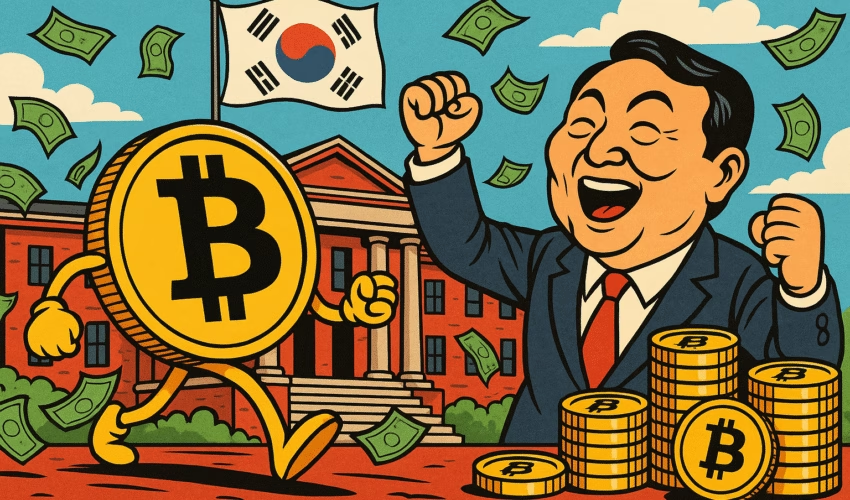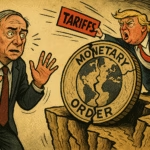Both Leading Candidates Back Spot Crypto ETFs, Regulatory Reform, and a Won-Pegged Stablecoin
As South Korea heads into a snap presidential election on June 3, the country’s rapidly growing cryptocurrency industry is poised to benefit regardless of who wins. Both of the leading candidates — Lee Jae-myung of the Democratic Party and Kim Moon-soo of the People Power Party — have outlined pro-crypto platforms that promise to legalize spot crypto exchange-traded funds (ETFs), ease current regulations, and even launch a stablecoin backed by the South Korean won.
Their bipartisan support for the digital asset sector marks a pivotal moment for South Korea’s crypto landscape, which has seen enormous growth but also regulatory uncertainty in recent years.
Political Backdrop: A Nation at a Crossroads
The snap election was triggered after the impeachment and removal of President Yoon Suk-yeol, following his controversial attempt to declare martial law in December. In his place, South Koreans will now choose between two high-profile figures, each with their own vision for the country — but united in their support for the crypto sector.
Lee Jae-myung, the current frontrunner and a member of the center-left Democratic Party, is facing off against Kim Moon-soo, a conservative nominee from the ruling People Power Party. A recent Gallup Korea poll conducted on May 28 showed Lee leading with 49% support, while Kim trailed at 36%.
Pro-Crypto Agendas from Both Sides
Lee Jae-myung has proposed an ambitious agenda that includes the legalization of spot crypto ETFs, the integration of cryptocurrency into South Korea’s national pension fund, and the creation of a stablecoin tied to the Korean won.
In a May policy forum, Lee emphasized the need to modernize South Korea’s financial system and retain capital within the country, stating:
“We need to establish a won-backed stablecoin market to prevent national wealth from leaking overseas. I will create a safe investment environment so that young people can build assets and plan for the future.”
Lee also intends to ease banking restrictions that currently force crypto exchanges to partner with licensed banks to offer fiat currency services — a major operational hurdle that has limited the market entry of new platforms.
Surprisingly, his opponent Kim Moon-soo has echoed many of these same positions. Kim has voiced support for the legalization of spot crypto ETFs and endorsed Lee’s stablecoin proposal, signaling a rare moment of bipartisan agreement in South Korea’s often divided political landscape.
Crypto Industry Applauds Policy Convergence
Industry leaders have welcomed the unified stance from both candidates. Simon Seojoon Kim, CEO of Hashed Ventures, a prominent Seoul-based venture capital firm, told Bloomberg:
“With all the major candidates supporting pro-crypto policies, the country’s crypto investors face a clear win regardless of the election outcome.”
This level of support comes at a crucial time, as South Korea is already home to one of the most active crypto markets globally. More than 18 million people, or over one-third of the population, are involved in crypto, according to Bloomberg. At times, daily crypto trading volumes have surpassed those of the country’s major stock indexes, and the total number of exchange users has recently crossed 16 million.
Urgency for Regulatory Clarity
Despite this widespread adoption, the crypto sector in South Korea has faced strict regulations and legal ambiguity. In July 2024, the government implemented new compliance measures targeting crypto exchanges, including potential life sentences for those found guilty of major violations.
In an effort to establish a more comprehensive framework, the Financial Services Commission (FSC) finalized a set of sweeping reforms on May 20. These measures included stricter listing standards, guidelines for nonprofit crypto sales, and enhanced due diligence for exchange operators.
The Democratic Party has also launched a Digital Asset Committee tasked with crafting crypto-specific policies and stimulating innovation in the digital finance sector.
Analysts say that with the legal foundation expanding, a supportive administration could pave the way for smoother institutional adoption, retail protection mechanisms, and potential foreign investment inflows.
What’s at Stake for Investors
At the heart of the discussion is the potential legalization of spot crypto ETFs, a long-anticipated step that could unlock mainstream access to digital assets via traditional investment platforms. South Korea has thus far banned such products, citing market volatility and regulatory concerns.
Allowing spot crypto ETFs would likely attract institutional capital and offer regulated exposure to crypto assets — particularly important in a country with a growing population of young investors looking for alternative asset classes.
Additionally, the launch of a won-pegged stablecoin could provide a blockchain-native alternative to traditional payment systems, enabling cheaper remittances, programmable finance, and cross-border use cases while maintaining monetary control.
Conclusion
South Korea’s upcoming presidential election presents a rare win-win scenario for the crypto industry. With both leading candidates advocating for progressive digital asset policies, the country appears to be moving toward a future of broader adoption, regulatory clarity, and technological innovation in the crypto space.
As the June 3 election approaches, investors and industry participants will be watching not for whether crypto will be supported — but how quickly and effectively the new administration can turn pro-crypto promises into action.












